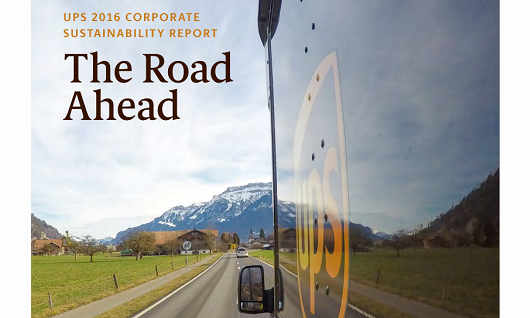UPS Celebrates 15 Years of Commitment to Transparency

UPS is one of the world’s leading providers of specialized package delivery and supply chain services. The US-based global logistics company employs over 434,000 people, and offers services in more than 220 countries and territories. UPS is committed to pioneering more sustainable solutions in every aspect of its business.
This year, UPS celebrates its 15-year sustainability reporting journey, and unveils new goals for the future – including a goal to reduce absolute GHG emissions across its global ground operations. Read how reporting has contributed to the UPS business strategy, and become an indispensable element of its stakeholder engagement.
When did your organization first begin reporting on its sustainability impacts, and how has your reporting process changed over the years?
We are proud to say that the UPS 2016 Sustainability Report: ‘The Road Ahead’, is our 15th report!
We began our reporting process in 2002 using the GRI G2 framework, and were the first in our industry to issue a sustainability report. This commitment to transparency is also what drove our decision to be one of the first companies to apply the G4 framework: Comprehensive option in our 2013 sustainability report. Our 2016 report continues this legacy by reporting in accordance with the GRI Standards: Comprehensive option.
What steps have you taken to enhance your 2016 report, based on your reporting experience?
Staying at the forefront of sustainability reporting best practices, UPS has become a member of the GRI Standards Pioneers Program to lead the transition from G4 to the GRI Standards, the latest reporting guidelines. With support and guidance from this group, we have already adopted the GRI Standards in our 2016 reporting cycle.
We have also taken strides to improve and expand upon our stakeholder engagement efforts and transparency in the 2016 report. Moreover, our entire report, including our greenhouse gas inventory, is assured by Deloitte and Touche, so we – and our stakeholders – know the data and information is accurate and credible.
What are the main sustainability targets you have set for the next reporting period?
We’re excited to announce a new portfolio of sustainability goals related to the environment, our workforce, and the communities we serve worldwide. These new goals are informed by the findings of our 2016 materiality assessment, our global enterprise strategy, stakeholder feedback, and sustainability frameworks such as the United Nations Sustainable Development Goals.
We’ve set a bold target to reduce absolute greenhouse gas emissions by 12% across our global ground operations by 2025. We’ve also established goals to advance our industry-leading safety programs, improve employee engagement, and give back to our communities through volunteerism and charitable contributions. We aim to align our business strategies with our vision to connect the global community through our intelligent logistics network.
Who are your organization’s main stakeholders?
We consider stakeholder engagement a critical aspect of our sustainability program. Our stakeholders include: customers, active and retired employees, policy makers and government officials, investors, communities, non-governmental organizations, and suppliers. These groups are essential to conducting our business, as well as developing and implementing our sustainability strategies. Our full report includes a deeper look at our key stakeholder groups, mechanisms for engagement, stakeholder expectations, and the actions we take to address their feedback.
What are the material topics covered in your report, and how did you determine them?
Our 2016 report features a refreshed global materiality assessment, incorporating findings from five regional materiality assessments conducted in 2015 and 2016 in collaboration with Business for Social Responsibility (BSR). The new and updated findings for 2016 include: further elevation of ethics and global human rights issues; the role of sustainability in attracting talent and engaging employees; region-specific emissions-reduction solutions and engagements; and developing locally-relevant sustainability strategies to address global trends. We are currently using the key findings from the 2016 materiality assessment to identify further opportunities to refine our global sustainability strategy.
In which ways has reporting helped you change business practices to improve your sustainability performance?
Reporting has helped us hold ourselves accountable – by setting goals and targets, and then reporting our progress each year. The reporting process has also helped us evolve our business and sustainability practices with the emergence of new material issues, through better-informed shifts in strategy. In addressing these emerging issues, we have found more sustainable and efficient ways to do our business worldwide.
Our regular materiality assessments and focus on regional issues around the globe has benefitted both our internal and external stakeholders. Through increased accountability and transparency, we have demonstrated to our stakeholders how we manage the issues most important to them. This regular dialogue with employees, customers, investors, community leaders, universities, public officials, suppliers, and third-party providers through formal and informal channels is essential to conducting our business, as well as developing and implementing our sustainability strategies.
Join the early adopters of the GRI Standards and be at the forefront of reporting. Read about the GRI Standards Pioneers Program to find out more.
GRI’s Premium Featured Reports Service is a paid-for promotional service for GRI’s GOLD Community Members. The service provides organizations with a high-visibility platform for their sustainability reports, by giving them a prominent place in the GRI Sustainability Disclosure Database and featuring them on GRI’s website. If you would like greater exposure for your GRI report, see the Featured Reports Service pages for more information on the process and pricing. Please note that the Featured Reports Service is in no way intended as an endorsement by GRI of an organization’s sustainability reporting or performance.

